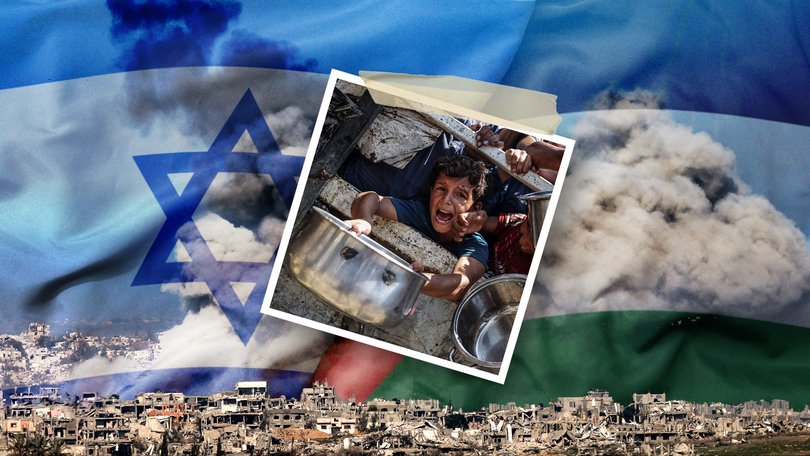BREN CARLILL: Gaza ‘famine’ claims obscure the truth, and the lies are increasing hatred
BREN CARLILL: International aid and human rights organisations are so intoxicated with Palestine Kool-Aid that they have failed to consider how their credibility has been tarnished.

The determination by a UN monitoring body that parts of Gaza are in famine encapsulates everything that is wrong with how the international community treats the Israeli–Palestinian dispute.
Gazans are the tragic victims of a terrible urban war. Hamas is using civilian infrastructure to aid in its fighting, which dramatically increases the impact on innocents. Unlike in most wars, civilians are unable to flee because Egypt has closed its border to them.
The aid situation is complicated because Hamas, armed gangs and civilians steal lots of it. The aid is stolen by the strongest, who typically sell it to traders, who on-sell it at highly inflated prices. The weak and poor suffer the most.
Sign up to The Nightly's newsletters.
Get the first look at the digital newspaper, curated daily stories and breaking headlines delivered to your inbox.
By continuing you agree to our Terms and Privacy Policy.Israel’s blocking of aid for nine weeks earlier this year, in order to stop Hamas from gaining a military advantage from stealing it, was technically legal, but tactically unwise.
After aid was allowed back in from mid-May, thieves looted almost all UN convoys. More than 90 per cent of its trucks were being looted, but the UN took no serious measures to prevent this.
Because of the looting, intended recipients were not receiving aid, but the UN did not increase the number of aid deliveries, even as Israel always transferred more aid into Gaza than UN agencies attempted to deliver.
Finally, facing global outrage because of viral images of starving children (some of whom had pre-existing medical conditions), both Israel and the UN-affiliated agencies began delivering much more aid into Gaza.
Prices in Gaza’s markets subsequently plummeted, and Gazan social media is filled with videos and images of Nutella being sold, pastries being made and restaurants being packed.
Enter the Integrated Food Security Phase Classification, a UN-affiliated body of experts that determines whether a situation has reached famine conditions.
Its standard methodology for declaring a famine situation includes a threshold of 30 per cent of children suffering from acute malnutrition.
However, for its August report on Gaza (based on measurements taken in July), the IPC adopted an ad hoc and less reliable standard that required a threshold of 15 per cent acute malnutrition for famine to be declared. Lo and behold, parts of Gaza were deemed to be in famine.
But that’s not the whole story. The IPC’s July measurements reveal that 12 per cent of the sample population in areas it subsequently found to be in famine faced acute malnutrition. However, the IPC’s August report only used parts of that data, publishing a level of 16 per cent, just scraping over the new threshold.
Another IPC-mandated threshold for declaring famine is two adult deaths (or four child deaths) from starvation each day per 10,000 people. The area facing famine, according to the IPC, has a population of about 500,000. If this area is in famine, that means 100 people are dying of starvation in that area every day.
However, al-Jazeera (hardly friendly to Israel), using Hamas-supplied statistics, alleges that, as of 24 August, a total of 289 people have died of starvation in the entire Gaza Strip since the war began in October 2023.
So, in short, the IPC had to change its criteria, then fiddle the books in order to reach its pre-determined conclusion that there is famine in Gaza and, even then, had to completely ignore its methodology relating to the death toll.
So why does this encapsulate the international approach to the Israeli–Palestinian dispute?
Because when people ignore facts or context, change their methodology or straight-up lie in order to make Israel look bad, three things happen.
First, Israel does, in fact, look bad in the eyes of many.
Second, Israel and its many defenders point to these manipulations and lies, and accuse the accusers of bias. They then don’t pay attention to what those accusers say, even when, among the lies, there are truths worth listening to.
Third, the actual, terrible, horribly complex situation is rendered black and white. Both sides and their supporters only point to the actions of the other side. The complex realities are ignored.
Such has been the case for the last 77 years. So many people are so determined to demonise Israel to further the Palestinian cause, that they’ll change the facts or the rules in order to justify their accusations.
Meanwhile, the international aid and human rights organisations, so intoxicated with the Palestine Kool-Aid they’ve been drinking, never stop to consider how their credibility has been tarnished by applying different standards to Israel.
In the meantime, innocents in Gaza continue to suffer. That 12 per cent of people in parts of Gaza face acute malnutrition is a tragedy that should have all parties involved, including Egypt and the UN, take a hard look in the mirror. That anyone, much less 289 people, have died of starvation is appalling. But it’s not famine, and false accusations there to only harden hearts on all sides.
If people truly cared about Palestinians, they would insist on truth. Not the truth once certain facts are manipulated or ignored, but the actual, complicated truth. Truth builds trust and trust builds peace. Lies increase the hatred.
Dr Bren Carlill is director of special projects at the Australia/Israel & Jewish Affairs Council
